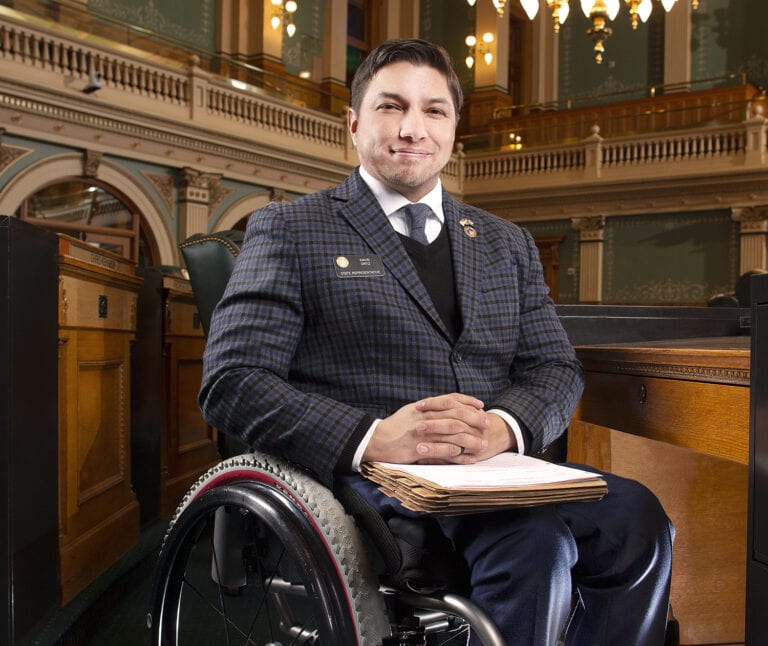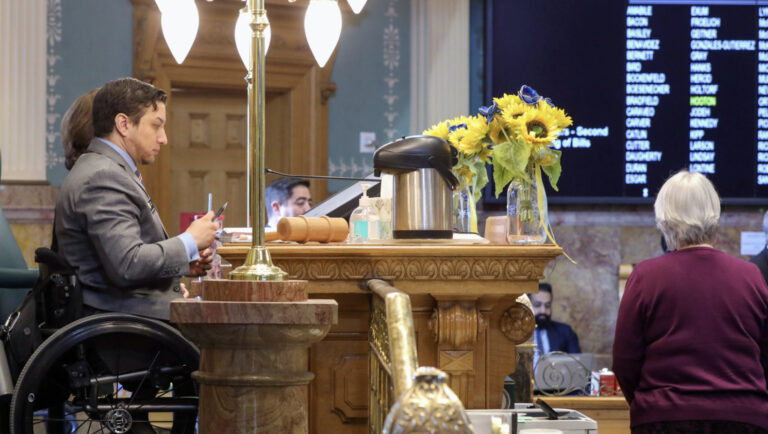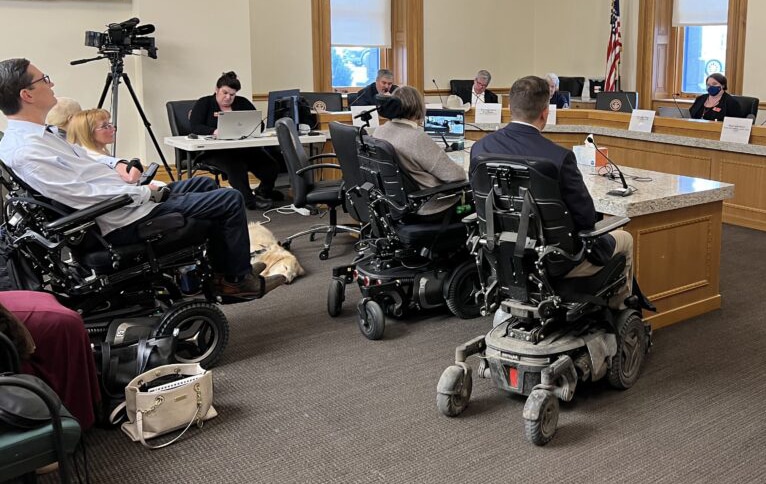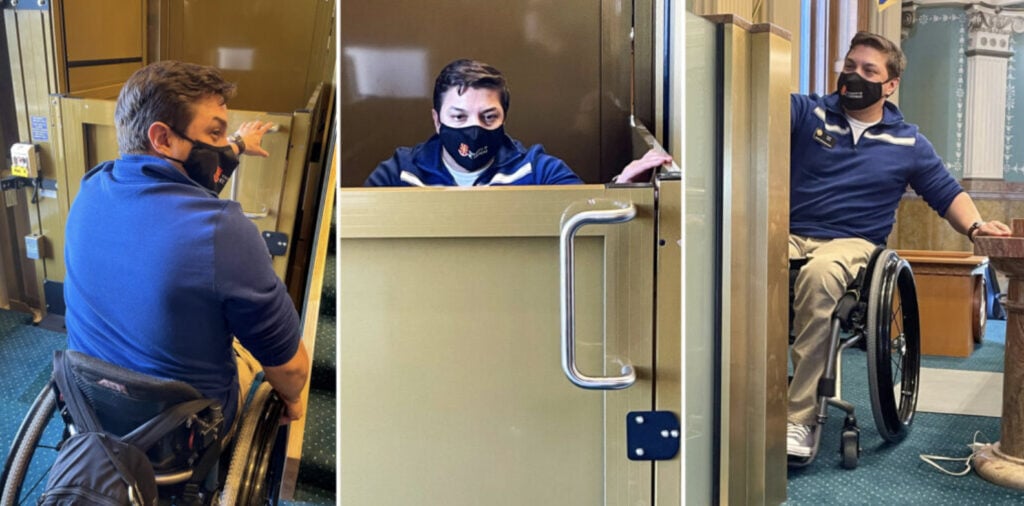
Photo by Bear Gutierrez
David Ortiz: A Fierce Advocate
When David Ortiz rolled onto center stage in 2021 as Colorado’s first wheelchair user elected to the state legislature, he knew that some people would automatically see him as “the disability” representative. Instead of bemoaning that reality, he went to work.
Building on the skills and insights he’d gathered over a life of service in the military, public and private sectors, he used his first term to establish himself as a legislative force, fighting for the things he believes in and the things his constituents need. No small feat, when you consider that as a disabled, bisexual, Latino veteran, his constituency goes well beyond the House District 38 voters who elected him.
Colorado’s legislative leadership recommends first-term representatives try to introduce five bills. Ortiz sponsored or co-sponsored 40. Thirty-five of those passed into law. Eight focused on disability issues, including pioneering legislation expanding options for power wheelchair repair and accessible vehicle rental.
For someone who was wary of being pigeonholed, he has emerged as a fierce advocate for the disability community who is willing to take on anyone or anything he sees impeding it. For these reasons and more, NM is honored to recognize David Ortiz as the 2022 New Mobility Person of the Year.
The Big Day
When the Colorado General Assembly is in session, House District 38 Representative David Ortiz starts his morning hygiene routine long before the sun rises. Like any good Army veteran, he’s got a process that works and he follows it. As a T10 paraplegic, he leaves two hours to go to the bathroom, get cleaned up, eat, spend some time with his wife, Kate, and head out the door for his 30-minute commute to the Capitol.
In the 10 years since he was paralyzed and sustained a traumatic brain injury in a helicopter crash in Kuwait, he’s learned to compensate for the extra time with efficiency and focus. People around him say he can be sweet, funny and goofy, but they struggle to come up with a time they’ve seen him slow down. Sarah Bennett, his legislative aide, is one of many colleagues who describe him as “driven.” “When you’re in the Army and you have your mission, you have to complete it,” she says. “He definitely feels like he has his mission in the legislature.”

Photo courtesy of Colorado Public Radio
Ortiz made history when he presided over the Colorado House on March 24, 2022.
That mission was put to the test many times over his first term, but perhaps no day demonstrated Ortiz’s approach better than Tuesday, March 22, 2022. Ortiz and his small team had long ago circled the date. Three disability-focused bills Ortiz was sponsoring or co-sponsoring — both of the Right to Repair bills and another that required car rental companies to provide adaptive technology and equal access — were up for debate in front of three different committees. The fate of the bills hinged on the hearings and Ortiz’s ability to execute the mission plan his team had assembled over the prior months.
The Team is Everything
Much of the hard work for that day had already been done by the time Ortiz arrived at the Capitol and headed into the assembly chambers for the morning. Ortiz prides himself on preparation and teamwork. He carries a small notepad with him everywhere to capture every idea and thought he wants to act on. His short-term memory isn’t what it was before the crash, and he doesn’t want to forget anything that could help.
Long before March 22, his team had ensured that all the committee meetings for the day would be held in accessible rooms, confirmed participation of all the people testifying virtually, and gone over the schedule with advocates and allies, some of whom were testifying before multiple committees.

Photo courtesy of Colorado Public Radio
Wheelchair users urge lawmakers to pass the Right to Repair bill
on March 22, 2022.
“The team is everything. That’s always been the cornerstone of my service,” he says. “It was important to make sure we had our advocate allies — like Colorado Cross-Disability Coalition, Disability Law Colorado, as well as others that represent our community — lined up and ready to go and understanding that it’s going to be a very packed day.”
Brianna Titone is a Colorado state representative who cosponsored two of the March 22 bills with Ortiz, an experience that gave her a deeper appreciation of Ortiz’s commitment to and knack for community-building. “He has the ability to tap into different groups of people because of the relationships he has,” she says. “He tries to really get the perspective of the people and to really build that relationship with the district.”
Even with the strongest relationships, bringing any three bills in front of three different committees in the same afternoon is a logistical nightmare. Adding in a large number of wheelchair users testifying and the hit-and-miss access of the Capitol building only elevated the potential for catastrophe.
Titone says Ortiz’s military background is evident in his calmness, whatever the circumstances. “As a pilot in the military, you have to have checklists and plans of what you’re going to do,” she says. “He knows exactly what he’s got to do. And he knows how to execute the plan, because that’s part of the dream.”
Family Values
The values that drove Ortiz’s March 22 plan and all of his policy and advocacy work were instilled by his parents at a young age. His mom migrated to the U.S. from Mexico at 16, and his dad served in the Air Force. The family moved around a lot, but Ortiz’s parents were consistent in hammering home the importance of service and the need to stand up for those who couldn’t fight for themselves. “Giving back was always something that I was raised with and was a tradition in my family,” he says. “You take care of community and the people around you, especially those that are weaker or marginalized, and you don’t suffer bullies.”
Post-college jobs helping Hurricane Katrina victims and working in the Houston mayor’s office gave him opportunities to put those values into action. He got firsthand views of the power of policy and the need for leadership in government, but after two years he needed more. “I wanted to serve my country in a more intense way,” he says. “Sitting behind a desk all day wasn’t it for me.”

In 2008 he enlisted in the Army, trading his desk for the cockpit of a Kiowa helicopter. After training, he ended up in Afghanistan on his first deployment. On June 21, 2012, on the way back to base from a combat mission, the engine exploded and the helicopter crashed. Ortiz woke up under a pile of metal, with a brain injury and a T10 SCI.
Just a month past his 30th birthday, Ortiz found himself mired in the Veterans Affairs hospital system. “The Army is really great when it comes to amputees and burns, but when it comes to something more complex, they just farmed me out to the VA because it’s cheaper for them. And the VA that I was at in San Antonio was fucking pathetic. It was the worst six months of my life, and you’re talking about someone that was in combat.”
One of his doctors who happened to be an incomplete quadriplegic told him he needed to get to a facility that specialized in SCI rehab. He settled on Craig Hospital in Colorado, but the Army pushed back. Eventually, after enlisting the media and elected officials to make his case, his transfer was approved. “Craig literally gave me my independence in my life back, and then the adaptive sports programs are what helped me make my life fulfilling again and realize what was possible,” he says.
At Craig, Ortiz rediscovered his voice as an advocate and worked to ensure other veterans with SCI had the same opportunity. Eventually one of his former battalion commanders urged him to take the next step. “He was like, ‘Hey, you’re outgoing, you’re a policy wonk, and you have a big mouth. Why don’t you advocate and lobby for veterans?’” After three years of doing just that for a handful of organizations, in 2019, Democrats recruited Ortiz to run for office.
If you’re a veteran needing assistance or resources, check out United Spinal’s Vets First program.
The Battle
All the planning for the big afternoon went into effect when the committee hearings started. One of the two Right to Repair bills was in front of the Public & Behavioral Health & Human Services Committee, the other was in front of the Health & Insurance Committee, and the third bill — concerning equal access for disabled people trying to rent cars — was in front of the Transportation & Local Government Committee. Ortiz raced between rooms to start the testimony, and kept track of each hearing’s status via texts from his team.
“The only analogy I can think of is it was like a general in a battle,” Ortiz says. “They go where they are most needed at the time, where they feel like the weakest point of the battle was happening for them.” But even with the best-laid plans, any good general knows to expect the unexpected. That day it came in the form of industry and corporate representatives having agreed to language in the bills, only to renege in front of committee. On the Right to Repair bills, pushback came from the rehab industry, while on the rental car bill, it came from the car rental industry.
“There was a lot of bait and switch with compromises that were made,” says Titone of the Right to Repair hearings. “It was really unfortunate because we made a really good faith effort to try to find common ground, and spent a lot of time and a lot of meetings to try to get it all right. And when we finally had our compromise and asked, ‘OK, is everybody good with this?,’ they said yes. Then, lo and behold, at the 11th hour, we didn’t have a compromise and they were trying to go back on it.”
Similar issues emerged in the hearing on the car rental bill. “You could tell the Republican senators that went up there were just regurgitating misinformed sound bites from Enterprise and car rental companies and their lobbyists,” says Ortiz. “They didn’t know what they were talking about. And really, it just made them look like assholes.”


Julie Reiskin, the co-executive director of the Colorado Cross-Disability Coalition, was one of a handful of wheelchair users to testify in favor of the Right to Repair bill. She has been continually impressed by Ortiz’s willingness to stand up for the disability community in the face of large corporate interests. Reiskin says lobbyists representing providers that make money off the disability community will often go to legislators claiming to represent disabled people, and Ortiz isn’t afraid to challenge that model. “David says, ‘You have a right to lobby for your business interests, but you’re not representing the disability community. We can speak for ourselves,’” Reiskin explains.
Bennett, then an intern, was equally appreciative of her boss’s no B.S. approach. “Hearing someone just shoot straight, and say, ‘No, I’m not putting up with this, I’m not going to appease your demands. We are putting this through to help the disability community,’ was honestly very inspiring.”
Ortiz knows that he can rub people the wrong way, but if that’s the cost of pushing the legislation he believes in, he’s OK with it. “I’m not here for people’s feelings,” he says. “Likewise, I’m not here to be rude, but if you’re running a bill that’s going to negatively impact the disabled community, I’m going to tell you.”
Titone summed up her co-sponsor’s approach: “He says what’s on his mind and he tells you without beating around the bush.”

Photo by Bear Gutierrez
Ortiz enjoys Colorado’s outdoor recreation opportunities, and he works to make sure they are as accessible as possible.
Thanks to the strong testimony and the work put in ahead of time, all three bills were passed out of committee, in spite of the unexpected last-minute opposition. “I don’t want to say that luck had nothing to do with it, but I think everything went really according to plan,” says Ortiz.
However, before anyone could celebrate, word got out that lobbyists were working to kill the bills. “I was very indignant and motivated to make sure that I wasn’t going to let them sink those bills,” says Ortiz. “We had to try to salvage that and make sure we didn’t end up losing votes and not passing the bills. It was too important, and we had to make sure they got passed.”
With the help of the broad coalitions he and his team had built, he reached out to legislators on both sides of the aisle to shore up the votes needed for an eventual floor vote. After over a month of scrambling, all three bills made it to the House floor, all three passed, and the governor signed them into law.
‘My True Vocation’
When former state Sen. Brittany Pettersen asked Ortiz if he had ever considered running for office, he told her he hadn’t. Pettersen, who has since been elected to represent Colorado’s 7th Congressional District in Congress, told him not to answer then and to talk to leaders in his district.
That district, House District 38, had been held by Republicans for the previous decade and was considered a “breeding ground of many of Colorado’s leading GOP candidates,” according to Coloradopolitics.com. Still Ortiz, a Democrat, did what Pettersen recommended. He kept hearing the same thing: We need someone like you to serve. “At the end of the day, that’s my true vocation, I like to serve. That’s why I was in the military. That’s why I do a lot of work for nonprofits. So, I said yes and I filed in May of 2019 to run for office.”
Ortiz assembled a large team of volunteers, raised a lot of money and ended up defeating the Republican incumbent by over 10 points.
All In for the Community
Despite an undeniably successful first term, there is obvious work to be done. The physical accessibility of the Colorado State Capitol provides a perfect metaphor. One of Ortiz’s first matters of business after being elected was securing an accessible office with the space and accommodations he needed. When the process dragged on, Ortiz pushed back. “They thought I was coming in too assertive and too aggressive,” he says. “That was the start of me being like, Oh, they don’t understand that this is not me being an asshole. This is me fighting for my community’s health and access.”
New lifts and floor renovations have improved access, but critical issues remain. “One of the reasons why I’m not running for leadership is because the entire chamber is not accessible yet,” says Ortiz. “How can I be a whip if I can’t get to every single legislator?”
While the progress may be frustratingly slow from Ortiz’s perspective, Reiskin says Ortiz’s impact has already been transformative for disabled people. “As someone who’s been doing this for many years, I’d say his presence at the Capitol is more of a game-changer than anything else he has done. It has created access in a way that we have never had, and quite frankly, could never have gotten without someone like him in there.”
In addition to physical access, Ortiz’s willingness to candidly share details of his day-to-day life have given many of his fellow legislators and the public a better appreciation of what living with a disability is like. “There were some marathon sessions where he stayed up in his chair too long and it resulted in some health problems,” says Reiskin. “He tweeted about it in detail and said, ‘I’m OK, I’m getting good care, and this is part of living with a disability.’”
The physical and mental toll of the job is substantial. During session Ortiz has little time for anything but work. “The stress of this work, and the time that it takes, impacts my health in a very negative way,” he says. He estimates he has made 15-16 trips to the emergency room since he announced his run in 2019.
On the heels of all of his accomplishments in his first term, Ortiz has abandoned any trepidation about being known for pushing disability issues. Of all the communities he intersects with, he says he feels the most responsibility to the disability community. “He doesn’t distance himself from us,” says Reiskin. “He’s proud of being part of the disability community and he embraces us.”
Ortiz notes that other minority groups have strong caucuses, but there is no disability caucus, and he is the only legislator with a mobility-related disability. “I know how inaccessible the world is, and I’m not giving up on this fight,” he says.

Photo by Marla Keown
David met Kate, an ICU nurse, in 2016. After postponing a 2020 wedding because of COVID, they tied the knot in 2021.
Real Change
Ortiz’s fight will continue for at least the next two years. In November, he won reelection with over 55% of the vote. He can point to the physical changes in the Capitol and the higher level of awareness around disability issues as signs of progress, but he and his staff are already hard at work on legislation for the coming session. Bennett says to expect a continued push on disability issues. “He tells me he can’t wait to pass a ton of legislation and then hand the bar off to the younger generation. He can’t wait to be a mentor.”
For his part, Ortiz claims to have no interest in running for higher office and says he is perfectly happy representing the people of his district. Reiskin sees a bright future for him whichever way he decides to go, but hopes he stays in public policy and politics because he is so gifted.
Reiskin was so impressed by Ortiz that she incorporated him into the graduate school class on policy she teaches. After playing a recording of him presenting a law, she tells her students, “This is how you do it. This is what real change is.”
—Additional reporting by Joelle Brouner
United Spinal Beyond Colorado
Colorado State Representative David Ortiz is one of the state legislators across the country focused on wheelchair repair issues. United Spinal Association understands that having a functioning wheelchair repair system for both power wheelchair users and manual wheelchair users is fundamental to a free and fair society in which all can participate. Various states and advocates across the country are focused on this issue.
United Spinal Pennsylvania advocates are supporting semiannual wheelchair maintenance visits paid for by insurers in Pennsylvania, known as the Wheelchair Quality Assurance Act, introduced by Pennsylvania state Rep. Dan Miller in Pennsylvania’s 2022 legislative session. Pennsylvania advocates are working with legislators to reintroduce that bill for the 2023 legislative session.
The Connecticut General Assembly has also been looking at this issue. Senate Bill 203, An Act Requiring Health Insurance Coverage for Motorized Wheelchairs, requires “health insurance coverage for (A) motorized wheelchairs, including, but not limited to, used motorized wheelchairs, … (B) motorized wheelchair repairs, and (C) motorized wheelchair battery replacements; and (2) require(s) health insurers to establish centralized locations to collect used motorized wheelchairs.”
United Spinal is working in coalition with many other disability advocacy and provider groups and other stakeholders in advocating for commonsense bills with core consumer protections. Among the solutions United Spinal is focused on are guaranteed routine maintenance coverage; (including the option of empowering wheelchair users to be able to repair certain wheelchair components such as tire tubes); guardrails around the use of loaner chairs; and, advocating for the use of telehealth for practitioners such as physical therapists, physical therapy assistants, occupational therapists and occupational therapy assistants which would enable clinicians to assist wheelchair users virtually for those individuals who are not able to get to a clinic for a wheelchair evaluation appointment. Stay tuned for updates.
—Alexandra Bennewith, Vice President, Government Relations
Support New MobilityWait! Before you wander off to other parts of the internet, please consider supporting New Mobility. For more than three decades, New Mobility has published groundbreaking content for active wheelchair users. We share practical advice from wheelchair users across the country, review life-changing technology and demand equity in healthcare, travel and all facets of life. But none of this is cheap, easy or profitable. Your support helps us give wheelchair users the resources to build a fulfilling life. |


Thank you for this article
We need the right to repair legislation everywhere. We also need to call the wheelchair manufacturers on their shoddy practices. Sunrise is especially egregious. The law says they must maintain parts for five years. Sunrise creates new model #s on a regular basis so that they don’t have to supply parts. Quoting, “As of 9/12/19, the sale of Quickie QM-710 & QM-720 has been discontinued. In compliance nth Sunrise Medical’s policy, replacement parts will continue to be available unit 9/12/2024.”
Permobil follows the same 5-year rule but keeps the same models year after year so that parts are available for a much longer period.
Sunrise quickly changed the model number on the QM series chairs the year I bought my chair. Permobil still markets the F5, M3 and M! without discontinuing the product. Permobil has upgraded the chairs but kept parts available for many years longer.
Thank you so much for your comment Stephen. Please see my note above, from Alexandra Bennewith, Vice President, Government Relations. ‘United Spinal Beyond Colorado’ United Spinal is working in coalition with many other disability advocacy and provider groups and other stakeholders in advocating for commonsense bills including core provisions to protect the consumer. We are having those conversations with advocates across the country. The Colorado bill is not the only solution and there are other provisions and protections that should be included. The current situation is unacceptable. Stay tuned for updates.